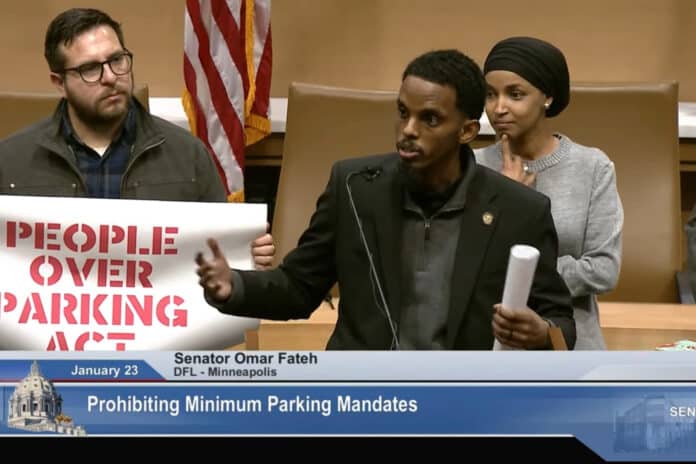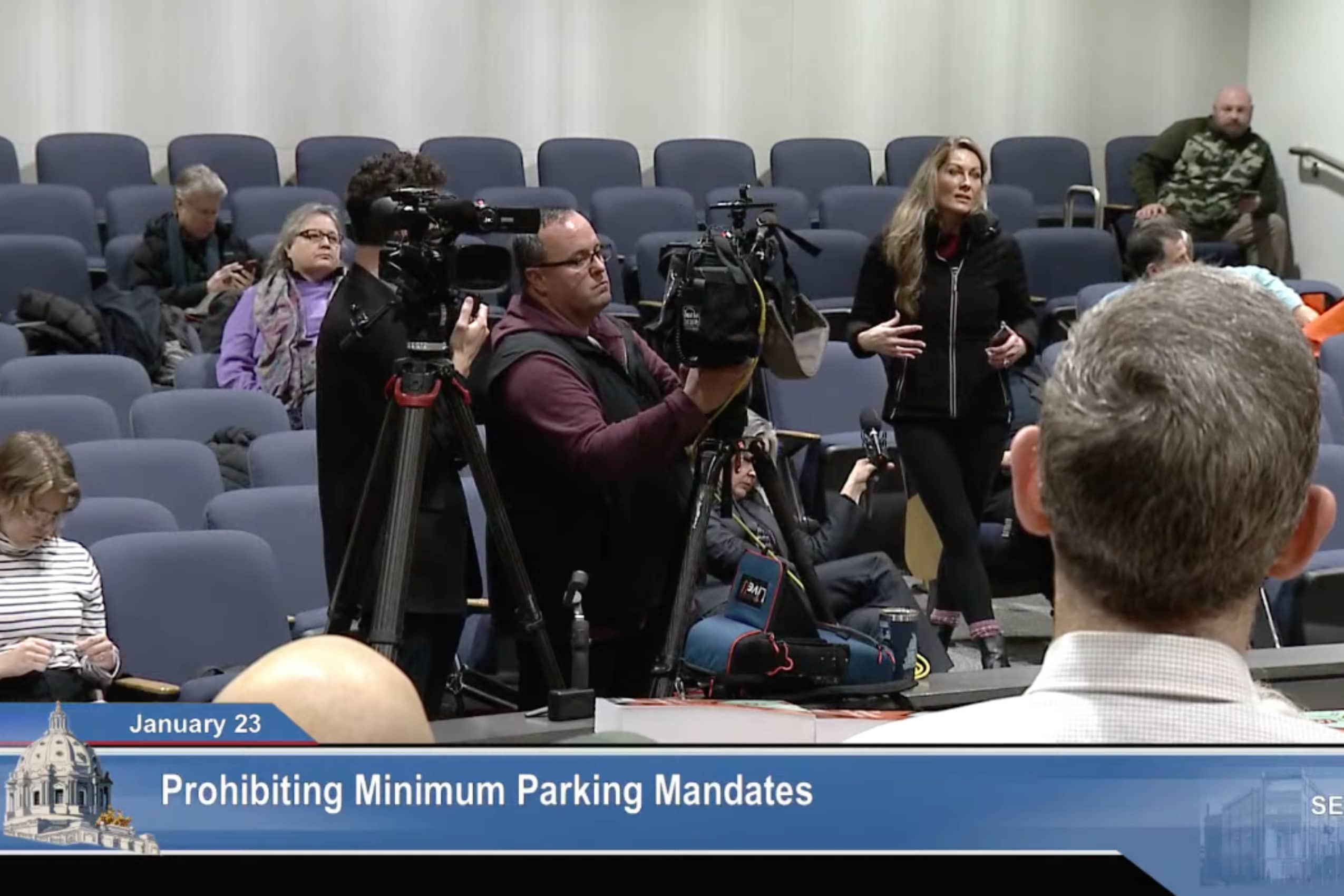
An urbanization non-profit that advocates for policies to hasten the end of what it calls the “Suburban Experiment” as a method of curbing climate change will be supporting a bill at the Capitol next month that would ban cities across Minnesota from imposing parking minimums for new development. Two Minneapolis-based elected officials are leading the effort at the state and federal level.
Chuck Marohn founded “Strong Towns” more than 15 years ago from his home in north central Minnesota. The organization, which he still runs out of an office building in Brainerd, took in about $1.25 million in grants and donations last year to help him advocate for a handful of different reforms, including bringing an “end to highway expansion” and banning cities from requiring parking minimums for new development — all with the goal of reducing automobile dependency.
While Marohn, who often writes that his ideological bent leans “free market” conservative, is careful to not overuse the phrase “climate crisis” on his “Strong Towns” website, the lineup of elected officials, urban planners and transit activists who gathered for a press conference at the State Capitol on Jan. 23 didn’t shy away from the term.
“The parking standards that dominate our codes and restrictions at the city level today are pseudo-science that came out of a snapshot of suburban expansion in the 1950s and are not applicable to cities generally today,” Marohn said at the Jan. 23 press conference promoting the legislation. A handful of youthful transit activists attended the gathering, which was promoted with a promise of pizza afterward.
Sen. Omar Fateh, DFL-Minneapolis, is sponsoring the “People Over Parking Act” which he says would amend a municipal planning statute to prohibit cities from imposing “minimum parking mandates for residential, commercial, or industrial properties within its jurisdiction.” The legislation is backed by Marohn’s “Strong Towns” organization.
Fateh told those gathered at the Jan. 23 press conference the legislation is desperately needed “to respond to two of the greatest crises of our time, the housing affordability crisis and the climate crisis.”
“This bill is a step toward making housing a human right, while protecting the environment to the benefit of us all,” said Fateh, who represents south Minneapolis and is a self-professed Democratic Socialist.
Fateh says he’s working on finding co-sponsors for the bill, which was brought to his attention by his legislative assistant and current Minneapolis Planning Commissioner Chris Meyer, who helped lobby the city of Minneapolis to enact its own prohibition on minimum parking requirements in 2021. That same year the city of St. Paul joined the movement. And in 2023 the cities of Willmar and Duluth changed their city code to no longer require new development to abide by parking minimums.
“It’s clear we really need to make this change, regardless of your ideology, across the spectrum, everyone should oppose wastefulness … They should care about this if they care about climate action, housing affordability, about healthcare; helping people get exercise built into their everyday lives,” Meyer said.
While the vast majority of cities in Minnesota and across the nation continue to utilize minimum parking requirements in their zoning codes, Fateh said those mandates equate to “excess parking mandates” that “have a devastating impact on the environment” due to runoff-related pollution and “cause people to drive more.”
Fateh was joined by Democratic Congresswoman Ilhan Omar, who is authoring her own version of the bill in the U.S. House of Representatives that would ban states from allowing cities to require developers to have some level of off-street parking.
Critics say parking minimum ban would harm businesses, not help them
But not everyone at the press conference was on board. Minneapolis realtor Lori Blomquist criticized the bill, saying that the city of Minneapolis has already seen negative effects since its City Council voted to end its minimum parking requirement ordinance.
“We’re having some serious issues right now on Hennepin and Lyndale avenues with a lack of access to our businesses,” Blomquist, a board member for the Minneapolis Business Alliance, said during the press conference. She mentioned that a woman who owns a UPS store in Minneapolis and in Edina has seen a large portion of her clients who used to use her Minneapolis location drive out to her Edina location because of growing parking issues.

“People who live in our city are now driving to the outskirts to get to where they need to be, to get their services done because we don’t have (parking) access to those services in our city,” Blomquist said. “Right now the businesses on Lyndale have been threatened by the removal of parking, and I would like to ask everybody in the room: who got here today in their vehicle?”
Fateh answered Blomquist’s feedback by emphasizing that the legislation does “not eliminate any parking, we are just saying give the business owners, give the builders the ability to make those decisions that fit their unique needs.”
But in a statement following the press conference, the Coalition of Greater Minnesota Cities criticized what it said is a “one-size-fits-all” solution.
“Cities already have the authority to eliminate parking minimums if they choose,” said Executive Director Bradley Peterson. “This proposal is premised on the idea that what is good for Minneapolis is automatically good for Mountain Lake, Moorhead, or Mahnomen.”
Note: This story has been updated to more accurately describe the non-profit Strong Towns’ participation in the Jan. 23 press conference on the bill and its public support for the legislation.
Hank Long
Hank Long is a journalism and communications professional whose writing career includes coverage of the Minnesota legislature, city and county governments and the commercial real estate industry. Hank received his undergraduate degree at the University of Minnesota, where he studied journalism, and his law degree at the University of St. Thomas. The Minnesota native lives in the Twin Cities with his wife and four children. His dream is to be around when the Vikings win the Super Bowl.












